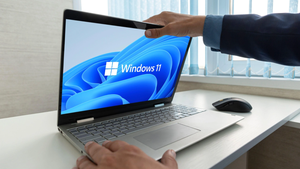Microsoft COO Kevin Turner followed Bill Koefoed's talk with a look at Microsoft's business offerings. This was a counterpoint, of sorts, to Steve Ballmer's discussion about Microsoft's lackluster consumer solutions, and it shed some interesting light on which aspects of business computing Microsoft chooses to target. Right off the bat, he tackled a pet peeve of mine: The small business market. I've always felt that this was the most "important" of the business segments, if you will, because it is the fastest moving and, from a unit perspective, largest of the business types. (The main others being mid-sized businesses, which is a tiny segment with tiny financial rewards, and the enterprise, which is a tiny segment with enormous financial rewards.) So I was happy to see him start with this comment: "I'll talk mostly about the core distinction that we have for small business, is it's the least publicized of all the businesses we have in the organization and it's also the most profitable part of our business as well." Unfortunately, it's unclear that he ever really fulfilled this promise in the talk. Overall, Microsoft's offerings are diverse, geographically. "We have and cater to all the customer segments that you can think of, from end users and consumers, to the largest governments and businesses in the world," he said. "We sell products out of 190 countries around the world, we have over 107 subsidiaries -- very, very diverse as it relates to, again, the geographic distribution." According to Turner, enterprise sales are 35.8 percent of Microsoft's overall business. Small- and medium-sized businesses are 20.5 percent. And OEM (PC maker) is 26.8 percent, with about a third of that constituting business PCs. So overall, businesses represent over two-thirds of Microsoft's business. But Microsoft is in the middle of a transformation, a "reboot," for cloud computing. That is actually the software company's main goal right now, according to Turner: Not just adaptin
ITPro Today logo
Microsoft 365Microsoft FAM 2010, Part 3: Microsoft's Business InitiativesMicrosoft FAM 2010, Part 3: Microsoft's Business Initiatives
Sign up for the ITPro Today newsletter
Stay on top of the IT universe with commentary, news analysis, how-to's, and tips delivered to your inbox daily.

.png?width=100&auto=webp&quality=80&disable=upscale)








.jpg?width=700&auto=webp&quality=80&disable=upscale)
